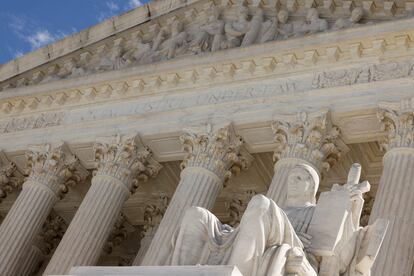Supreme Court allows Idaho to enforce its ban on gender-affirming care for transgender youth
The justices’ order Monday allows the state to put in a place a 2023 law that subjects physicians to up to 10 years in prison if they provide hormones, puberty blockers or other gender-affirming care to people under age 18

The Supreme Court is allowing Idaho to enforce its ban on gender-affirming care for transgender youth while lawsuits over the law proceed, reversing lower courts.
The justices’ order Monday allows the state to put in a place a 2023 law that subjects physicians to up to 10 years in prison if they provide hormones, puberty blockers or other gender-affirming care to people under age 18. Under the court’s order, the two transgender teens who sued to challenge the law still will be able to obtain care.
The court’s three liberal justices would have kept the law on hold. Justice Ketanji Brown Jackson wrote that it would have been better to let the case proceed “unfettered by our intervention.”
Justice Neil Gorsuch of the conservative majority wrote that it is “a welcome development” that the court is reining in an overly broad lower court order.
A federal judge in Idaho had blocked the law in its entirety after determining that it was necessary to do so to protect the teens, who are identified under pseudonyms in court papers.
Lawyers for the teens wrote in court papers that the teens’ “gender dysphoria has been dramatically alleviated as a result of puberty blockers and estrogen therapy.”
The American Civil Liberties Union, representing the teens and their families, called the Supreme Court’s order “an awful result for transgender youth and their families across the state. Today’s ruling allows the state to shut down the care that thousands of families rely on while sowing further confusion and disruption.”
Idaho Attorney General Raúl Labrador said in a statement that the law “ensures children are not subjected to these life-altering drugs and procedures. Those suffering from gender dysphoria deserve love, support, and medical care rooted in biological reality. Denying the basic truth that boys and girls are biologically different hurts our kids.”
Gender-affirming care for youth is supported by every major medical organization, including the American Medical Association, the American Academy of Pediatrics and the American Psychiatric Association.
Medical professionals define gender dysphoria as psychological distress experienced by those whose gender expression does not match their gender identity.
The action comes as the justices also may soon consider whether to take up bans in Kentucky and Tennessee that an appeals court allowed to be enforced in the midst of legal fights.
At least 23 states have enacted laws restricting or banning gender-affirming medical care for transgender minors, and most of those states face lawsuits. A federal judge struck down Arkansas’ ban as unconstitutional. Montana’s ban also is temporarily on hold.
The states that have enacted laws restricting or banning gender-affirming medical care for transgender minors are Alabama, Arkansas, Arizona, Florida, Georgia, Idaho, Indiana, Iowa, Kentucky, Louisiana, Mississippi, Missouri, Montana, Nebraska, North Carolina, North Dakota, Ohio, Oklahoma, South Dakota, Tennessee, Texas, Utah and West Virginia.
Sign up for our weekly newsletter to get more English-language news coverage from EL PAÍS USA Edition
Tu suscripción se está usando en otro dispositivo
¿Quieres añadir otro usuario a tu suscripción?
Si continúas leyendo en este dispositivo, no se podrá leer en el otro.
FlechaTu suscripción se está usando en otro dispositivo y solo puedes acceder a EL PAÍS desde un dispositivo a la vez.
Si quieres compartir tu cuenta, cambia tu suscripción a la modalidad Premium, así podrás añadir otro usuario. Cada uno accederá con su propia cuenta de email, lo que os permitirá personalizar vuestra experiencia en EL PAÍS.
¿Tienes una suscripción de empresa? Accede aquí para contratar más cuentas.
En el caso de no saber quién está usando tu cuenta, te recomendamos cambiar tu contraseña aquí.
Si decides continuar compartiendo tu cuenta, este mensaje se mostrará en tu dispositivo y en el de la otra persona que está usando tu cuenta de forma indefinida, afectando a tu experiencia de lectura. Puedes consultar aquí los términos y condiciones de la suscripción digital.








































